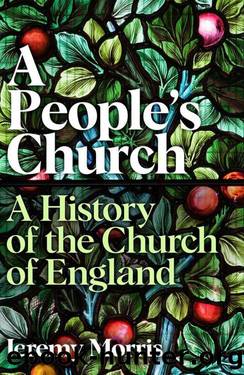A People's Church by Jeremy Morris

Author:Jeremy Morris [Morris, Jeremy]
Language: eng
Format: epub
Publisher: Profile
Published: 2022-04-06T16:00:00+00:00
PART 3
THE AGE OF THE PEOPLE
13
THE HIGH CHURCH REVIVAL
Before the constitutional reforms of the 1820s and 1830s, most Anglicans agreed on the authority and utility of the established Church. The effects of the Evangelical revival were being felt in a reinvigorated parish ministry in many places, in a new idealism and zeal for overseas as well as domestic mission, in education and in moral and social causes such as abolitionism. But Evangelicals rarely positioned themselves polemically over and against High Churchmen, even if some High Churchmen were wary of the âsaintsâ. All that was to change. The political changes of these years triggered internal disagreement between Anglicans over Church authority that widened into internal conflict, leading to the emergence of distinct church âpartiesâ in the middle of the nineteenth century. It is from this time that we can date the modern typology of Anglicanism, its strange accommodation of three quite distinct, even sharply different, approaches to Christian belief â the Evangelical, the Anglo-Catholic, and the Liberal.
High Churchmen took an active part in efforts to revive the national Church before 1828.1 The âHackney Phalanxâ, for example, a circle of High Church clergy and laity centred around the wine merchant Joshua Watson, included a bishop of Durham, a Master of Trinity College, Cambridge, and a number of prominent High Church theologians.2 They strongly supported the National Society, published journals, encouraged church building, and were instrumental in the creation of Kingâs College, London. Many of the bishops stood in this tradition, too. William Howley (pronounced âHooleyâ), for example, bishop of London from 1813 and then archbishop of Canterbury from 1828, was satirised by Jeremy Bentham as the âProstrator-general of willsâ because he had argued that the true Christian shows âa prostration of the understanding and willâ to the authority of the Church, a classic High Church emphasis.3 But Howley, as his modern biographer argues, was in fact an active, reforming bishop, who, in concert with Charles Blomfield, oversaw the work of the new Ecclesiastical Commission. Before the 1830s Church âpartyâ lines were fluid, however. There were no substantial differences between them in forms of worship and liturgy, nor in clerical dress. There were not even sharply divergent practical approaches to the sacraments. There were some theological differences over the doctrine of salvation, including predestination, and the relative authority of Scripture. There were also cultural and devotional differences of language and tone, and distinct social networks. But as yet these had not hardened into defining battle lines.
Evangelicals and High Churchmen alike supported the close partnership of Church and State, but on different grounds. Evangelicals mainly viewed establishment instrumentally, as a providential means by which the work of the Church, and so the proclamation of the Gospel, could be promoted. Church order could change; any specific form of it was not absolutely validated in Scripture, though Christians were obliged to respect the authorised form embodied in the Church of England. This position is sometimes labelled âErastianâ, that is, assuming the subordination of the Church to the State, though that is not strictly fair to the Evangelical view of the supremacy of Scripture.
Download
This site does not store any files on its server. We only index and link to content provided by other sites. Please contact the content providers to delete copyright contents if any and email us, we'll remove relevant links or contents immediately.
| Anglican | Baptist |
| Book of Common Prayer | Calvinist |
| Episcopalian | Inspirational |
| Lutheran | Methodist |
| Pentecostal & Charismatic | Presbyterian |
| Quaker | Seventh-Day Adventist |
| Shaker | Theology |
Angels by Billy Graham(1920)
How To Be Born Again by Billy Graham(1775)
Peace with God by Billy Graham(1679)
Unbroken Curses by Rebecca Brown & Daniel Yoder(1569)
God's Prophetic Symbolism in Everyday Life by Adam Thompson & Adrian Beale(1491)
The School of Biblical Evangelism by Ray Comfort(1425)
Call by Rick Joyner(1423)
Martin Luther: The Man Who Rediscovered God and Changed the World by Eric Metaxas(1386)
Power over the Enemy by John Osteen & Joel Osteen(1349)
Fresh Wind, Fresh Fire by Jim Cymbala(1231)
Jonathan Edwards: A Life by Marsden George M(1231)
Prayers That Bring Healing and Activate Blessings: Experience the Protection, Power, and Favor of God by John Eckhardt(1215)
Liturgy of the Ordinary by Tish Harrison Warren(1212)
The Supernatural Power of a Transformed Mind Expanded Edition: Access to a Life of Miracles by Bill Johnson(1195)
Unmasking the Devil: Strategies to Defeat Eternity's Greatest Enemy by John Ramirez(1192)
An Altar in the World by Barbara Brown Taylor(1191)
Reformation Theology by Littlejohn Bradford(1184)
Martin Luther by Mansch Larry D.; Peters Curtis H.;(1130)
Seeing the Voice of God: What God Is Telling You through Dreams and Visions by Smith Laura Harris(1123)
